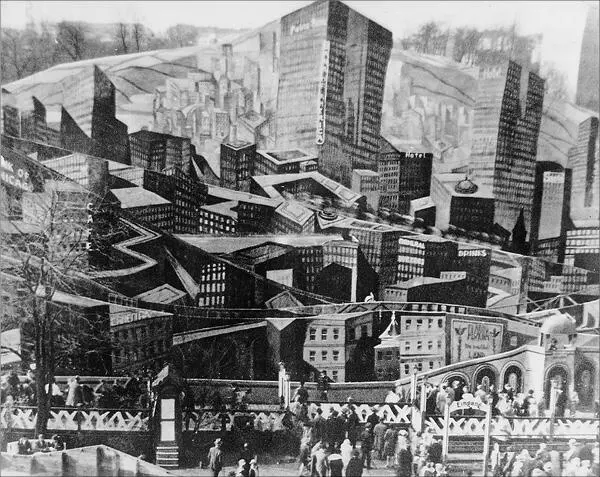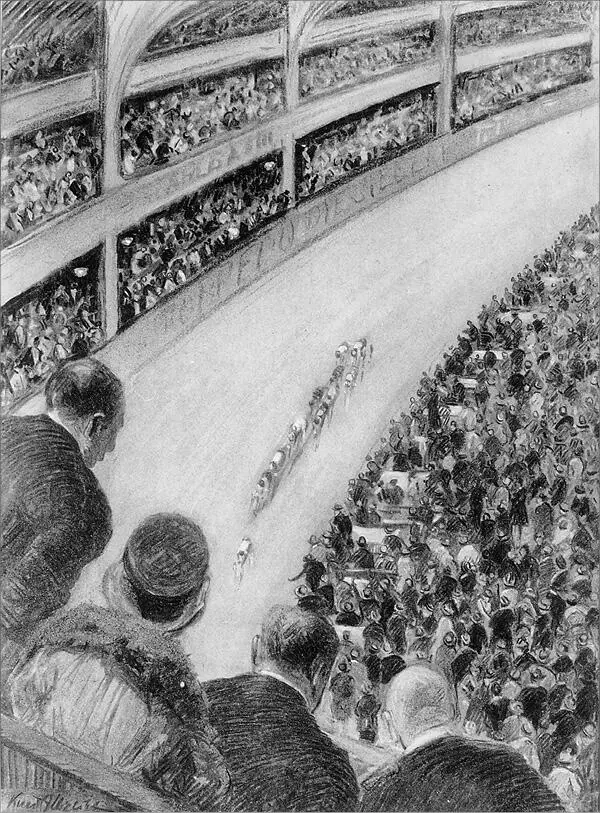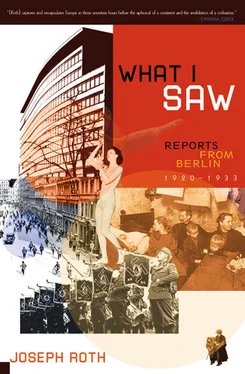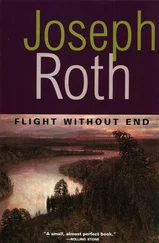
Roller coaster in Luna Park, 1928.
See the Tin Lake! Its metal waves coil endlessly, the pushing and lifting force of hidden engines creates swells and calms, heights and troughs. You sit in your boat and think the gentle rhythm of the water will rock you a little. Then a wave rears up and makes straight for you. You struggle against it, without leaving the spot, till an expert knocks your boat forward with a contemptuous shove. The energy you expended would have sufficed to see you through a real storm at sea.
Someone tries to cover a round target with six flat rubber disks. He throws one after another, hoping to win himself a wristwatch. The desire to win impels his arm, the fear of losing holds it back, and his excited consciousness, the seat of prudence and of frivolity, wavers between the will to throw and the trembling arm. Meanwhile any jewelery store would offer him the same “guaranteed 100 percent Swiss watch” for the same money and with no exertion or risk.
The enjoyment here is in the mockery of human endeavor. I watch a gentleman shattering the crockery in the “China store” by flinging hard rubber balls at it. He isn’t aware that the sounds of breakage are what prompt him to new efforts, he throws one ball after another, he hasn’t noticed that a number of people are clustering around, watching him. Maybe they have some terrible glimmering of the truth, and the question whether this devastation might be the meaning of life, is stillborn on their lips. .
Frankfurter Zeitung, May 16, 1924
26. The Twelfth Berlin Six-Day Races (1925)

As I write, the eager cyclists have already covered more than eight hundred miles, without having gone anywhere. They don’t even want to get anywhere! They go around and around the same track, which is two hundred meters long and a million meters boring. If this track had a finish line, then you could say there was a prize waiting for them at the end, for which it was worth putting themselves through six days of torment. The track has no finish line, but still there is a prize for the riders: That’s the type of silly, childish thoughts I have as I watch the race. There are only another hundred hours to go. If I stayed here, my face would get to look like the loudhailer by which the crowd in this madhouse is from time to time fed bits of information. Astonishing, really, that they still look human. They ought to look like loudhailers, like screams, like brutal desires, like beery ecstasies, like bicycles, like blind wants, like decadent barbarism. But the unconscious drive to remain in God’s image seems to be so strong in humans that not even the six-day races can quite eradicate it. They still look human, even at the end of six days of racing, or of watching the races. On the sixth day God created man, so that man might race for six days. It was worth it.
It’s a Saturday night. Packed buses race through the streets headed for the Kaiserdamm. There are a hundred policemen. At the turnstiles the people press — there really isn’t a comparison, I should have to say — like people trying to get into the six-day races. At eight o’clock the loudhailer announced that there were no more tickets. There are resigned people, turning back, quiet, sad, their heads hanging. They are inconsolable. That’s the way souls look as the gates of heaven are banged shut in front in their metaphorical faces. Whole families head for home. Men with crying infants in their arms. Men who seem close to tears themselves. Oh! Where can they go now? Six days they have worked, and every evening, before going to sleep, they have sworn to others and to themselves that on the Saturday they would definitely go to the six-day races. What’s left for them? Suicide, at best! But even experienced suicides will insist that their own death is much less exciting than one of Huschke’s “breaks.”
Enough of those unhappy ones! Let’s turn our attention instead to those prudent souls who four days ago locked up their homes and set off with backpacks, subtenants, grandchildren, dogs, parrots, and canaries to the Kaiserdamm, to set up house there. They have brought with them everything the police have said it is illegal to bring. Their pets are in the rucksacks, occasionally betraying their presence with pathetic cries for help, directed at a public that is not inclined to betray its humanity by any sort of sympathy. The moment a tormented dog yelps here, he sounds like one of the humans anyway. All the way around the steep walls, faces, faces, faces. The rows are like shelves, head is pressed alongside head, like the spines of books in a great library. Sometimes you get a notion you might take down one or another of them from its place, between finger and thumb. But you’d be wrong. The heads are mounted on bodies, and the bodies are glued — glued by excitement and sweat — to their seats. Ten thousand throats emit a wild cry, a single cry, that drowns out the more evolved yelp of any barking dog. Down there a rider has “broken.” What a sensation!
Painful, the deathly white of the floodlights, great lamps as hard and heartless as suns in the underworld, glacial suns, spreading an atmosphere of polar festiveness. The shine of the lights drives you toward the cloakroom. Just where the cone of light cuts into the shadow with a razor-sharp edge, millions of particles of dust are busy. When the crowd cries out, there is a commotion among them: tumult, terror, chaos among the placid Brownian floating and drifting of the dust particles. So violent is the effect on the atmosphere. Sometimes the dust storm of ecstasy is enough to throw the packed human ranks into disorder as well. Shrill women’s cries (giving the lie to the expression “weaker sex”) whirl furiously into the massed basses of men’s voices, and it is like being given a firsthand experience of the Furies. At the same time a conscientious housewife unpacks some long-stored piece of cheese from the editorial page of her newspaper, and there is a whiff of food and politics. The smell sinks, beaten down by the gravid air, hangs above the heads of those sitting below like a louring cloud, and they look up, suspiciously, furiously, as though they could see the smell and kill it with their eyes. Somebody cracks a joke, a whole row laughs, one witticism sets off another, and, like matches, they flare up and burn down.
Policemen hold on to pillars, occasionally even, when there is no honest citizen around, on to the backs of pickpockets, for a sight of the track. So far is the majesty of the state lowered by the enthusiasm of the population. It’s impossible to spot the plainclothesmen, not even with their regulation rubber collars on. They could really achieve something here — if only they were still up to it! If a burglar managed to get to the racetrack, it would be like a sanctuary for him. Thirsty people pull bottles of schnapps out of their pockets and offer their neighbors a drink. People behave humanely, as during a shared calamity. Someone who has left his seat to answer a call that is even more irresistible than the lure of the six-day races returns to find his place taken. Then human kindness turns into its opposite, and there is a bout of fisticuffs between the two pretenders. The great excitement holds thousands of little excitements.
Down below, on the mirror-smooth track, the riders go around, backs parallel to the ground, around and around and around. Hour after hour, mile after mile. Push pedals, right and left, break, get left behind, ahead of you another man, steel and rubber, a shirt, dripping sweat, all round you the crowd, at the end of six days a prize, a bath, a long rest, a photographer, flashbulbs, a woman, champagne, a trip somewhere, a write-up in a sports paper. At the end of six days is life, which exists for you because you’ve just raced for six days, and so that you can race another six days. You’re not yet dead, but you’re still waiting to enter life. Listen to the trumpet, the six days of judgment are at hand, the loudhailer announcing a prize for winning a section of the race, awarded by a patron who’s feeling bored, and doesn’t want to have come here for nothing. He has things to do later, his chauffeur is freezing outside, clapping his hands to stay warm. So: Let’s put up a small prize to give the lazy fellows a kick up the behind, get them to show a bit of life! They show a bit of life.
Читать дальше














